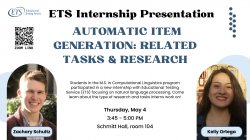Educational Testing Service (ETS) Internship Presentations
Posted in: Homepage News and Events, Linguistics News

You’re invited! Come hear from Computational Linguistics students who participated in an internship program with Educational Testing Service (ETS).
Thursday, May 4, 3:45 – 5:00pm
Schmitt Hall, room 104
or, join us via Zoom: https://montclair.zoom.us/j/81643825185
In the fall of 2022, the Educational Testing Service (ETS) introduced a year-long internship program for M.S. Computational Linguistics graduate students at Montclair State University. The internship aims for students to work with ETS employees on projects relating to natural language processing, specifically test and Automatic Item Generation (AIG) development. This presentation, delivered by ETS Interns Kelly Ortega and Zachary Schultz, will examine and explain some of the tasks performed throughout the internship in the frame of Automatic Item Generation. Projects to be discussed include passage development, item writing, article extraction and parsing, and more.
Student presenters:
- Kelly Ortega is an M.S. Computational Linguistics student graduating in May 2023. As she looks forward to joining the workforce, she sees the many ways ETS has prepared her for the tech industry through hands-on research. She appreciates her ETS internship experience emphasizing a linguistic and technical background. She is excited to present what she has learned with her fellow students and the faculty at MSU.
- Zachary Schultz is an M.S. in Computational Linguistics student graduating this May. He is a previous pharmacy student who decided to pursue his passions of language and technology. His time at Montclair State University has been invaluable in helping him to learn and grow in this field and his time as an intern with ETS has only amplified this. He is looking forward to sharing what he has done during this internship, as well as what new knowledge and competencies he has gained.
ETS mentors:
- Dr. Lin Gu is a Senior Research Scientist in the Center for Language Education and Assessment Research. Lin has broad training in the areas of language pedagogy, language testing, and educational measurement. She received her Ph.D. degree in Second Language Acquisition from the University of Iowa. Since joining ETS, Lin has focused her research on validity issues in assessing English language learners, technology-enhanced language assessments, and the use of AI in learning and assessment contexts. She has led multiple-year research projects, developing and evaluating automated feedback on speaking performance. Working with cross-functional teams, Lin has developed AI-augmented educational solutions that are well-grounded in language learning principles and measurement science. In addition to language learning and assessment, Lin was also a key player contributing to ETS’ research agenda in assessing high education learning outcomes in an international context. Lin has published in a variety of journals, including Language Testing, Language Assessment Quarterly, English for Academic Purposes, Assessment in Education: Principles, Policy & Practice, Assessment and Evaluation in Higher Education, and Nature Human Behaviour.
- Dr. Michael Flor is a Senior Research Scientist in the Center for Learning and Assessment Foundations, in the R&D Division of the Educational Testing Service (ETS). Michael is a computational linguist. He earned a PhD in cognitive psychology with specialization in psycholinguistics from Tel Aviv University, Israel. He joined ETS in 2005. His research focuses on automatic processing of text data for education, combining linguistic, statistical, and cognitive approaches. His work spans both published research and development of applied systems. His work included automatic spelling correction for student essays, automated estimation of text complexity, figurative language detection, measuring lexical cohesion in text, automatic scoring of essays, and automatic question generation. His current research interests include idiomatic expressions and automatic item generation (AIG).
